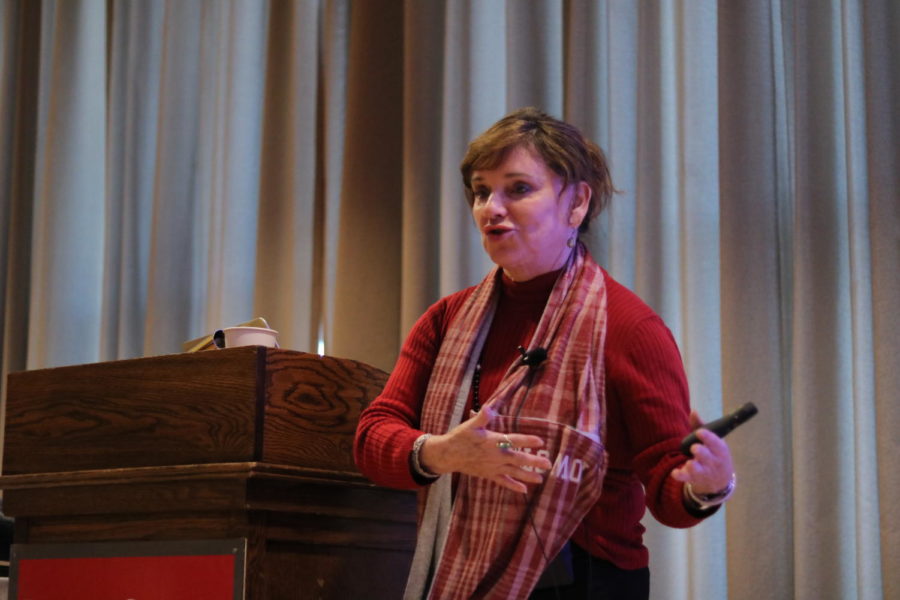The critical time period for dual language learning
Linda Espinosa, professor of Early Childhood Education at the University of Missouri, speaks in the Memorial Union on Tuesday, April 10.
April 11, 2018
Linda Espinosa, professor emeritus of early childhood education at the University of Missouri – Columbia, spoke about the significance on teaching dual language learners from a young age on Tuesday night.
Dual language learners are young children, learning two or more languages at the same time, as well as those learning a second language while continuing to develop their first (or home) language.
“The age for dual language learners is from birth to five,” Espinosa said. “Children who start K-12 term are English language learners.”
Espinosa said the diversity within Iowa dual language learners and English language learner’s population is striking.
“Spanish is the primary non-English language followed by Vietnamese, Bosnian and Chinese,” said Espinosa. “Ninety percent of [dual language learners] of age zero to five were born in the U.S.”
Among those children, a high percentage of them are found in lower socio-economic conditions and have less access to high quality early childhood experiences.
“Children from low-income dual language families highly vulnerable to underachievement,” Espinosa said. “What are we doing wrong?”
Espinosa pointed out the difficulties of implementing dual language teaching in classrooms. She said there is a general unpreparedness in the dual language education realm, and it’s an issue that needs to be addressed preventatively.
“Having more than one language during (early childhood experience) years should not be considered a risk factor,” said Espinosa. “The topic touches nerve on most people in the field.”
Espinosa showed multiple studies results that dual language learners have lower infant mortality rates, fewer mental health problems when growing up and have strong social skills.
Espinosa said language is the foundation for literacy, and literacy in English is critical for academic success. She suggested that parents should encourage their kids to speak their first language instead of forcing them to speaking only English even at home.
“Those kids should have an opportunity to learn English also have a chance to speak their home language,” said Espinosa. “What we do in ECE programs, from group time to meals, from teacher-student interactions to story books, would have a huge impact on children’s future.”
Espinosa then showed a TED talk video of Patricia Kuhl, co-director of the Institute for Brain and Learning Sciences at the University of Washington. Kuhl did numerous studies and experiments on infants’ language learning.
Her results showed that language has a critical period for learning, and small infants and children are exceptional at learning languages until they turn seven, and then there’s a systematic decline.
The scientific reason behind the findings is that babies listen intently to adults, and they take statistics as they listen. But adults are no longer absorbing those statistics, because they are governed by the representations in memory that were formed early in development, according to Kuhl.
At the end of the lecture, Espinosa said the kindergarten is a critical period for all children to develop two language learning system, and she encouraged everyone to support the implementation of teaching strategies.
“We can’t all instruct, but we can all support,” Espinosa said.







